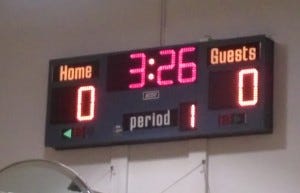Keeping score
When the going gets tough, the scoreboard is useful feedback, even if it tells a difficult story.
On the heels of the Boston Celtics’ 18th championship this past week, and in light of my fervent Celtic fandom, you might not be surprised that basketball is on my mind.
However, before my Celtic vignette at the end, the bulk of this column is about another game from 2016. And, really, it’s not so much about that particular game as some broader observations about the dubious, coddling way it was administered.
From the archives: February 10, 2016
While coaching my daughter’s basketball team a few weekends ago, we ran into a formidable opponent. They were clicking on all cylinders; my girls seemed to be sleepwalking.
The upshot wasn’t pretty: Early in the third quarter, the rout had climbed to 41-15 and we were well on our way to our third consecutive loss to start the season. The next time I glanced at the scoreboard, the clock was working just fine but the score had reverted to declaring what it stated at tip-off: 0-0.
The game went on as if not keeping score was a perfectly natural thing to do in the midst of a contest. I didn’t press the issue at the time, but a few days later conferred with the opposing team’s coach.
He had inquired during a timeout with the scoreboard operator, who said it was park district policy to turn off the scoreboard when one team was up by at least 25 points.
The `Grace Rule’ at Play
I checked out the league rules and, true enough, item #12 declares, “Grace Rule: Once a team reaches a 30-point lead, the score will be reset to zero and not kept from that point on. The clock will remain on.”
Aside from the slight jumping of the gun—we were down by “only” 26 points at the time—the scorekeeper was simply following protocol. So, I have no beef with him.
Likewise, I am sure it was a well-meaning individual or set of individuals (and a crafty wordsmith) who came up with this notion to revert to zeroes on the scoreboard—and invoke that cute phrasing of “grace rule.”
Well-meaning, but ill-advised.
After all, what’s the lesson we are implicitly teaching children when we turn off the score if it reflects a blowout in progress? That their psyches are so fragile, their potential trauma so extreme that we need to coddle them when the going gets tough, lest they develop poor self-esteem?
Furthermore, some of society’s most compelling stories are improbable athletic comebacks that astound and amaze.
What kind of room exists for that turn of events when we introduce the artificial 0-0 equation?
The Underbelly of Good Intentions
You don’t need a master’s degree in metaphor-making to show this mindset’s absurdity and danger when applied to the Big, Bad World of Business or the School of Hard Knocks. Bottom lines are bottom lines and, in sports, a scoreboard without a score begs the question, “What’s the point of even calling it a contest?”
The opposing team’s coach and I successfully lobbied the park district supervisor to drop the 0-0 routine, should either of our teams find itself up (or down) by a similarly lopsided score in the future. Meantime, I’ve let my girls know that we’re going to continue to aim for victory. Or, at least, less crushing defeats.
So far, so good: the next game, we actually led after the first quarter, 8-6. The girls reassured me that they didn’t feel the need to quit while ahead. We promptly fell apart. Down by six at the half, we trailed by 23 in the fourth quarter before a late rally closed the gap to 38-21.
Of course, we wouldn’t have known all of those ebbs and flows if the digits indicating the score had remained frozen on zeroes. And at the end, everyone in the gym knew who had won, who had lost, and the margin.
All they had to do was look at the scoreboard.
One Final(s) Scoreboard
On Monday night, after the Celtics routed the Dallas Mavericks to win their latest NBA title, I trekked to Sonny McGee’s in Santa Monica, California.
Located 2,999.3 miles from TD Boston Garden (according to my Google map), the Beantown-centric sports bar had been a mob scene three nights earlier. That’s when I watched from there with a cousin and my wife, Bridgett, whose diligent research is what brought us there in the first place during our week in La-la Land.
Alas, the Celts came out flat and lost that one, their only defeat of the series. In keeping with this column’s theme, I suppose you might expect me to mention the score, but you can look it up.
Anyway, here Bridgett and I were again about an hour after I’d seen Game 5 at another bar with a few friends. We’d come to Sonny McLean’s for two things:
First, to catch the lingering vibes of what had surely been a raucous and joyous celebration.
And second, to buy a shirt modeling Boston’s four major sports team logos. I threw it on immediately.
Then I entered the men’s room, where the establishment provides pieces of chalk to spur on, ahem, creative expression on the chalkboard. In the midst of the choice words for Maverick stars Kyrie Irving and Luka Doncic, something else caught my eye.
It’s the tally just beneath the blue eraser mark I etched onto the photo below: “18-17.” As any Celtic or Los Angeles Laker fan surely knows, that’s the number of NBA championships for the Celtics versus the number of titles claimed by the Lakers.
Keeping score, indeed.






I have found that the most competitive kids always know the score, scoreboard or no scoreboard, and have the arrogance to think their team should always win, because they think they control the outcome. It is 200% a good thing that they think this, and I always regretted that I was not talented enough to have the same level of caring or arrogance.
As I got older and transitioned more to intramurals, I found I had a very difficult time keeping track of the score. Again, I felt this was a very bad thing, but what was I do? I couldn't help how I felt, and that I didn't have the interest. Not caring about the score is very bad because it means that you don't care if you win. This is much worse in a team game. It's your choice to feel that way as an individual, but if you feel that way in a team context, you have to ask yourself if you're all about you. You particularly need to ask that question if your propensity to lose track of the score INCREASES in team competitions.
Remaining frenzied and competitive in sports like basketball and volleyball is more challenging than in sports like soccer and hockey. Then I would dream of getting the goal when I was out there. No one could get one. There was no need of worrying about keeping track. But too soon, the horn would sound, and once again I was not the hero.
The only place where I differ is I am uncertain that removing a scoreboard has this strong negative effect you allege. I agree the symptom is bad, but I see it as more of an internal issue. If you could take those star athletes, though, those who carried their teams, and somehow they lost track of the score, yes, I can imagine it would be a bit for them like journeying somewhere blind. I just don't think that's going to happen.
As an aside, I do a lot where I force myself not to look at a clock. I think looking at a clock can be a loser's psychology. But I am just estimating time in my head instead on those occasions. I pretty much time and schedule everything I do. Obviously I can't go over, but I check the time at extended intervals. But if I actually lost track, if I actually forgot about time, while that might be wonderful and expansive in some contexts, in general it would be the end of my motivation, and I think it is the same with most people.
It's 2024. Youngsters need to learn beating the point spread is a necessary stage of development.